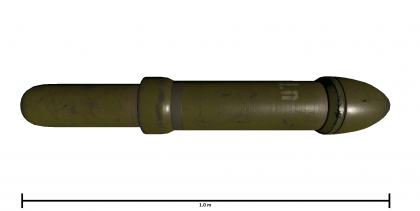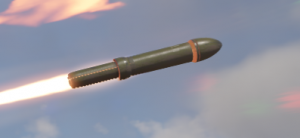Wgr.41 Spr
Contents
Description
The Wurfgranate 41 was a projectile fired by the 15 cm Nebelwerfer 41. It was spin-stabilized and featured quite an unusual design, with the rocket motor placed in the front and the explosive charge positioned at the tail. It was known for its utility, being used for all types of bombardments over the course of the war, including gas and smoke deployment.
Vehicles equipped with this weapon:
General info
The 15cm Wurfgranate 41 is best used at shorter ranges, due to it being inaccurate and highly affected by gravity, requiring the user to make aim adjustments based on the target's distance from the launcher. While the rocket contains a whopping 2.15kg of explosive mass, it is also large and has extremely poor penetration (27mm), which only allows it to overpressure enemy vehicles if a weakspot is hit. Such a hit, however, will almost always knock out the enemy vehicle without the need of a follow-up shot.
Effective damage
The rocket is highly explosive, which allows it to knock out open-topped vehicles with shrapnel without the rocket hitting the vehicle itself. The high explosive mass will, in almost all cases, destroy an enemy vehicle instantly upon succesful penetration or overpressure. In the event of the rocket failing to pierce enemy armor, its detonation will still be powerful enough to destroy their tracks, immobilizing the enemy and allowing the user to more carefully aim their next shot at the opponent's weakspots.
Comparison with analogues
The Wurfgranate 41 is somewhat different from other vehicle-mounted rockets, such as the M8, being heavier and larger yet containing more explosive material. That means it is less effective at longer ranges due to a slower projectile speed and higher firing arc, but is also able to overpressure vehicles more easily thanks to the higher caliber and more explosive power.
Usage in battles
The Wurfgranate is best used against lightly armored and open-topped vehicles, which it is able to easily destroy with a single, often indirect hit. Should it be used against heavier opponents, the rocket has the best chance of knocking out its target by overpressuring its roof armor. Because of this, unless facing light vehicles, the user should always attempt to aim the rocket at the enemy tank's roof or turret front.
Pros and cons
Pros:
- High explosive mass
- High firing arc allows it to hit targets hiding behind cover from above
- Produces a large cloud of smoke and dust upon detonation, which can blind and disorient enemy vehicles
Cons:
- Slow projectile speed
- High firing arc makes aiming difficult for inexperienced users
- Loud sound and a trail of smoke produced during initial launch, often betraying the user's position
- Poor penetration (27mm)
History
Designed specifically for the Nebelwerfer in mind, the Wurfgranate 41 was first issued to troops in 1940, after the Battle of France. Thanks to its utility, it saw extensive use in bombardment campaigns from 1941 all the way to Germany's surrender in 1945. It was used for explosive shelling, smoke deployment and toxic gas distribution. Almost five and a half million projectiles were manufactured over the course of the war. Due to its distinctive sound, allied troops nicknamed the Wurfgranate the "Screaming Mimi" or "Moaning Minnie".
Media
Excellent additions to the article would be video guides, screenshots from the game, and photos.
See also
External links
Paste links to sources and external resources, such as:
- topic on the official game forum;
- other literature.





